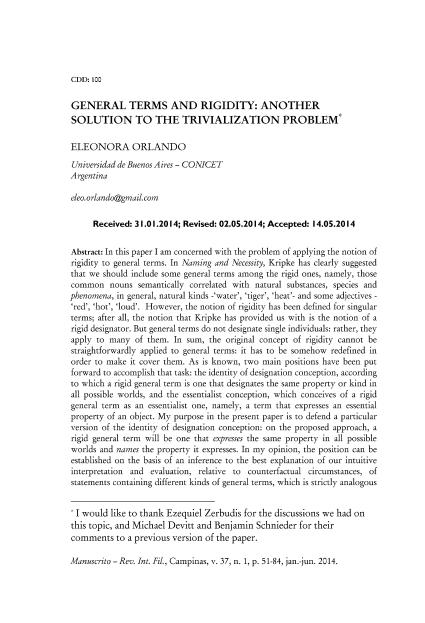Artículo
General terms and rigidity: another solution to the trivialization problem
Fecha de publicación:
06/2014
Editorial:
Universidade Estadual de Campinas. Centro de Lógica, Epistemologia e História da Ciência
Revista:
Manuscrito
ISSN:
0100-6045
e-ISSN:
2317-630X
Idioma:
Inglés
Tipo de recurso:
Artículo publicado
Clasificación temática:
Resumen
In this paper I am concerned with the problem of applying the notion of rigidity to general terms. In Naming and Necessity, Kripke has clearly suggested that we should include some general terms among the rigid ones, namely, those common nouns semantically correlated with natural substances, species and phenomena, in general, natural kinds -'water', 'tiger', 'heat'- and some adjectives -'red', 'hot', 'loud'. However, the notion of rigidity has been defined for singular terms; after all, the notion that Kripke has provided us with is the notion of a rigid designator. But general terms do not designate single individuals: rather, they apply to many of them. In sum, the original concept of rigidity cannot be straightforwardly applied to general terms: it has to be somehow redefined in order to make it cover them. As is known, two main positions have been put forward to accomplish that task: the identity of designation conception, according to which a rigid general term is one that designates the same property or kind in all possible worlds, and the essentialist conception, which conceives of a rigid general term as an essentialist one, namely, a term that expresses an essential property of an object. My purpose in the present paper is to defend a particular version of the identity of designation conception: on the proposed approach, a rigid general term will be one that expresses the same property in all possible worlds and names the property it expresses. In my opinion, the position can be established on the basis of an inference to the best explanation of our intuitive interpretation and evaluation, relative to counterfactual circumstances, of statements containing different kinds of general terms, which is strictly analogous to our intuitive interpretation and evaluation, relative to such circumstances, of statements containing different kinds of singular ones. I will argue that it is possible to offer a new solution to the trivialization problem that is thought to threaten all versions of the identity of designation conception of rigidity. Finally, I will also sketch a solution to the so-called 'over-generalization and under-generalization problems', both closely related to the above-mentioned one.
Archivos asociados
Licencia
Identificadores
Colecciones
Articulos(SEDE CENTRAL)
Articulos de SEDE CENTRAL
Articulos de SEDE CENTRAL
Citación
Orlando, Eleonora Eva; General terms and rigidity: another solution to the trivialization problem; Universidade Estadual de Campinas. Centro de Lógica, Epistemologia e História da Ciência; Manuscrito; 37; 1; 6-2014; 51-84
Compartir
Altmétricas




